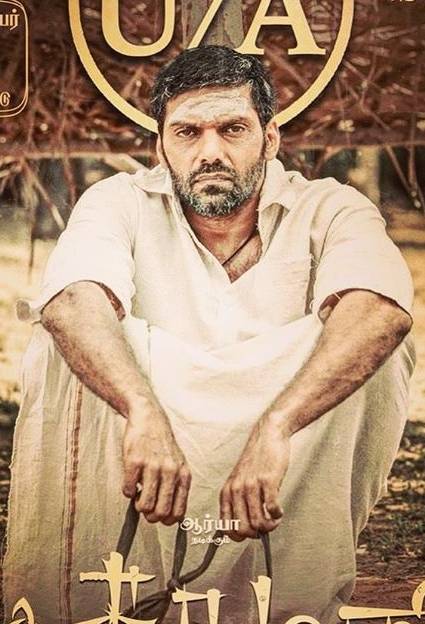The three social lines of commentary in ‘Magamuni’
Home > Visitor Columns
Behindwoods.com isn't responsible for the views expressed by the visitor in this column. The visitor claims that this column is his/her own. If the column infringes any copyrights that you hold, please email us at columns@behindwoods.com.
Mahamuni, starring Arya, Mahima Nambiar, Indhuja, Ilavarasu and Jayaprakash among others, is an important movie for a variety of reasons. Firstly, the film is a well-made thriller with some clever markings and twists. The acting, cinematography, and the direction are all top-notch. While the pacing of the movie could be a minor bummer, there is no reason as to why this film cannot work as a worthwhile experience.Secondly, the writing of the film is quite brilliant.
The manner in which Santhakumar has taken a simple drama and made it into a gripping thriller is noteworthy. The characters are all well sketched and (in most cases) fully fleshed out. When you walk out of a movie remembering most of the characters by name, it only means applause for the writer. The third reason and the most crucial of them all is the social commentary that runs along with the film’s course from start to finish. The best part of the movie is how even the most preachy dialogues gel well with the flow of the screenplay. It is never just words. The director shows. So, here are the three social lines of commentary that are worth discussing from the film. Obviously spoilers for the film is to follow.
Faith (and caste)
The movie is titled “Magamuni” for a reason. In fact, the entire movie can be summarized as the journey of a man who is coming to terms with his inner peace and guilt. There is an instance where a character tries to explain “God” and the explanation assumes significance with the ending of the film. Worship, religion, and tradition mean absolutely nothing when a person cannot learn and practice the philosophy of goodness.
The film also tries to stress on embracing the teachings of 'Magamunis', the ones who came before. Wisdom is what separates humans from the concept of god and the director uses the arc of the titular character(s) to bring out this thought. When humans started searching for answers to absolve them of their guilt, religion was born as a path towards attaining peace. God is just a tool. The untouchability angle of the movie makes you wonder, “Is Muni (Arya) actually from a privileged caste?” (Like Karna in Mahabharata). The director never reveals the answer. Because that is irrelevant. He has made his point. Also, he showcases how nonchalantly our society uses the term “family friend” for “Nama aalunga”. Notice closely and you will see the fact that no outsider steps into Jayaraman’s (Jayaprakash) house. That is why there is a charger plug in the verandah.
Power (and Money)
The initial scenes show how much Maha (Arya) is in need of money. But his manager refuses to give him an advance. At this moment, the director cuts to the picture of an idol hanging in the manager’s room which is decorated with a garland made up of ten-rupee notes.The movie touches upon the angst of the proletariats by running parallels to the thug story of Maha. The working class remains faithful, while the men in power tend to be selfish and money-minded. The men in power always settle their differences and rivalries. But it is the followers of their false propaganda who get trapped.
The story is not unlike Pa. Ranjith’s delightful Madras. The men at the top, push those below who in turn do the same to their subordinates (Bala Singh - Ilavarasu - Arya). Muthuraj (Ilavarasu) never settles Maha’s dues. Yet he is always busy counting the racks of money he has with him. Maha, in the end, shoots at this very racks to get his vengeance. One of the movie’s poignant lines is when a dejected Maha (pointing a gun) asks a terrified Muthuraj “Yen annae?” which sounds so much like “You too Brutus?”. Maha perpetually trusted Muthuraj only to be sorely betrayed at the end. It’s impossible to not see the similarities between Maha and an ordinary blue-collar worker.
A Woman (and another woman)
Deepa (Mahima) and Viji (Indhuja) are two very different women. The former strives to be a strong independent woman while the later exclaims “Nee poita enaku intha oorula polaika theriyathu da!” to her husband.The director portrays the lives of everyday women by giving us the stories of these two extreme characters. Deepa was born to a father who married twice just because he wanted a (boy) heir. She doesn’t want to live a life like her mom. She wants to live her life on her own terms. Mahima Nambiar’s eyes reflect the character’s tenacity.
Viji, on the other hand, is cornered and has nowhere to go after the seeming loss of her husband. Because she has been dependent all this while. Her circle is limited only to her husband and her son. She asks Maha, “Pondati kita solla mudiyathamari velai en pannanum?”. She doesn’t want her husband to be involved in such a mess. But again like the million other women out there, poor Viji is also helpless. The naïve innocence of the character as portrayed by Indhuja is heart-wrenching. There were quite a lot of pictures on Deepa’s wall, but the most prominent picture of them all was that of Thanthai Periyar. I am sure that wasn’t a coincidence.
- Arunachalam Senthilnathan
arunachalam345@hotmail.com
Please send your column to columns@behindwoods.com.
OTHER LATEST VISITOR COLUMNS
RELATED NEWS
- Witness 'Muni' from Arya's Magamuni here! New video out!
- Breaking: Pa.Ranjith's next is a multi-starrer!
- Breaking: தமிழில் மூன்று ஹீரோக்களை இயக்கும் பா.ரஞ்சித் - விவரம் இதோ
- ஆர்யாவின் "மகாமுனி" படத்தில் இருந்து வெளியான ஸ்நீக் பீக் வீடியோ இதோ!
- A confused husband and a doting wife! Magamuni Sneakpeek 2 Video here!
- சூர்யாவின் ரசிகர்களே தயாரா ? - 'காப்பான்' First Show எப்போ தெரியுமா?


